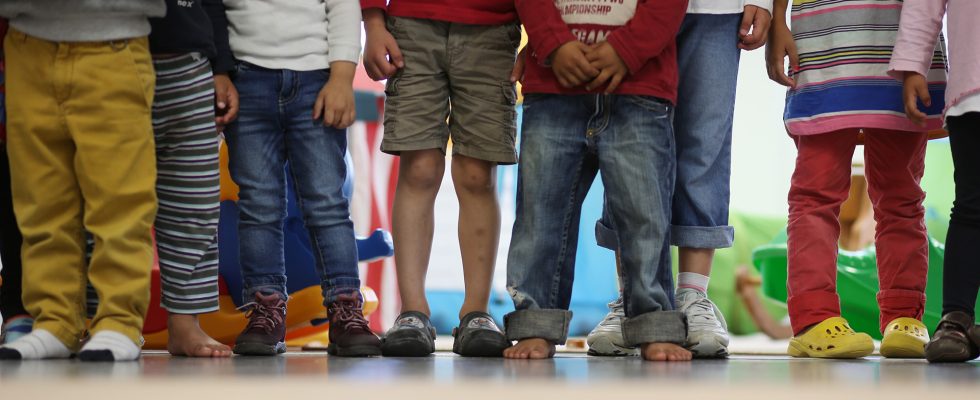Status: 04/23/2023 7:35 p.m
Every fifth child in Germany is affected by poverty. Family Minister Paus calls for twelve billion euros for basic child security. But is there a plan for how the money should be used?
Michael’s life got off to a difficult start. When he was two years old, he was placed in a home. Today he is 19 years old and knows the problems and prejudices that one experiences as a child in Germany: “I know that when I wore shoes that didn’t have a logo on them, the other children talked about them. But I don’t wear them let me get to it. But I know that there are many children, also in my children’s home before, who were affected, who asked the supervisors, why me, why can’t I have more…”
Successful as “das Heimkind” on TikTok
Michael doesn’t want pity. He is about to graduate from high school and wants to study law. Two years ago he started a TikTok channel, calling himself “the home child”. He has over half a million followers and even earns money with it. But financially, the rude awakening soon came. Michael had to give a quarter of the money he earned to the youth welfare office.
In official German, that was called the cost approach. A few years earlier, it was even 75 percent that young people had to hand over to the youth welfare office if, for example, they did an apprenticeship and earned money as a result. For Michael, this was exactly the wrong state signal for children and young people who are committed and try to build their own existence on their own.
As “the home child”, Michael has over half a million followers on TikTok. He had to give a quarter of the money he earned to the youth welfare office.
Image: Kerstin Palzer, ARD Capital Studio
Rarely just a money problem
Since January 2023, this tax has finally been abolished. Affected people like Michael are relieved, but call for more targeted measures for children from disadvantaged families, especially in the area of education. Child poverty affects every fifth child in Germany. In the Berlin district of Lichtenberg it is one in three. And child poverty is rarely just a money problem. It is almost always about a lack of participation: no sports club, no music lessons, no private tuition.
In the Wilhelmsberg elementary school in Berlin-Lichtenberg, there have been health professionals, school nurses, so to speak, for four months. A pilot project that only exists here in Berlin. The district is committed to prevention and hopes health workers can stay longer, as so far the money has only been approved until the end of this year. The big advantage of this measure: the school nurses take care of them in a very concrete way, and the parents don’t have to fill out any forms. Because so far it has been impossible for many families to fight their way through the forms. According to the Federal Ministry for Family Affairs, for example, only 35 percent of the child allowance for poorer families is used.
Lisa Paus, Federal Minister for Family Affairs, B’90/Die Grünen, on the planned basic child security
Report from Berlin, April 23, 2023
A promise of advancement that is no longer valid
In Germany there was once the promise of advancement: “Anyone can do it here.” According to a recent study by the ifo Institute, which was published this week, this is hardly the case anymore. Accordingly, the education of the parents is the decisive factor for whether a child makes it to high school. The head of the study, Ludger Woessmann, therefore also calls for measures with which “we as a society enable the children themselves to later stand on their own two feet”.
The expert names six recommendations for action for politicians: a free day care center for all children, a longer common elementary school period, financial supplements for teachers at “difficult” schools and free and early tutoring are among them. Parents should also be empowered and supported, and mentoring programs for disadvantaged children created by students.
In the current discussion about basic child security, the family policy spokesman for the FDP, Matthias Seestern-Pauly, criticizes the bureaucracy for families in difficult situations. “The problem is that the vast majority of eligible children don’t receive the benefits because it’s too complicated, how far too many agencies are involved.”
“A bargain for billions”
Even the left-wing faction, which is otherwise committed to more money in the social systems, sharply criticizes the fact that the family minister only estimates the twelve billion euros she is asking for basic child security and does not seem to have a substantive plan.
Group leader Dietmar Bartsch no longer believes that basic child security will come in this legislative period. “I don’t believe for a second that basic child security – like Mrs. Paus wanted years ago – is still realistic. That’s a bargaining chip for billions and not what this major political reform project should have.”
If you ask Michael, the foster child and the successful TikToker, what kind of help is really needed for poorer children, the answer is clear: “You would have to invest in the school, in an institution where the state can really control what is going on with the money happens that I give away. Which is not the case in a family where the money is simply paid to the parents.” Therefore, more funding must be provided in the schools and not simply more money paid out, “which in the end is burned money”.

